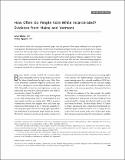How often do people vote while incarcerated? Evidence from Maine and Vermont
Author(s)
White, Ariel R.; Nguyen, Avery
DownloadPublished version (78.16Kb)
Publisher Policy
Publisher Policy
Article is made available in accordance with the publisher's policy and may be subject to US copyright law. Please refer to the publisher's site for terms of use.
Terms of use
Metadata
Show full item recordAbstract
Recent debates about enfranchising incarcerated people raise the question of how many additional votes such policies would generate. Existing research finds very low voter participation among previously incarcerated people, but it remains unclear how often people might vote from prison if given the opportunity. We use data from states that allow people to vote while incarcerated for felony crimes, to address this question. We merge prison records with the voter file to estimate how many currently incarcerated people are registered and voted in recent elections. Estimates suggest very few (under one in 10) eligible incarcerated voters in Vermont and Maine voted in the 2018 election. Given the winning margins in other states’ recent elections, these estimates suggest that enfranchising currently incarcerated people would likely not have changed these statewide election outcomes. We conclude that debates about enfranchisement should focus less on anticipated electoral effects and more on normative issues.
Date issued
2021-10Department
Massachusetts Institute of Technology. Department of Political ScienceJournal
The Journal of Politics
Publisher
University of Chicago Press
Citation
White, Ariel R and Nguyen, Avery. 2021. "How often do people vote while incarcerated? Evidence from Maine and Vermont." The Journal of Politics.
Version: Final published version